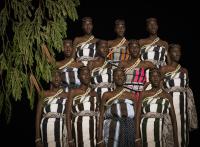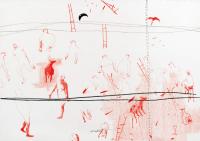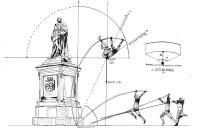 Whether in terms of its officially ensconced denial or the radical geopolitical reformulation of Portugal after decolonization, the Colonial War remains historiographically unresolved. The experience of participation in the war is one of the most repressed and complex, but also one of the most tragic, events of Portuguese contemporary life, and it continues to resonate today.
Whether in terms of its officially ensconced denial or the radical geopolitical reformulation of Portugal after decolonization, the Colonial War remains historiographically unresolved. The experience of participation in the war is one of the most repressed and complex, but also one of the most tragic, events of Portuguese contemporary life, and it continues to resonate today.
To read
30.03.2019 | by Margarida Calafate Ribeiro
 The work suggests that another person’s perspective, and their particular capacities, affects the inherited vision. This vision, diminished or amplified, can cloud, obscure, or deform the receiving view; but it may at the same time provoke the heir to explore the ways that their perspective belongs neither only to them, nor any longer only to the bequeather. And this question, which starts with recognising this inheritance, can also be the starting point for other visions.
The work suggests that another person’s perspective, and their particular capacities, affects the inherited vision. This vision, diminished or amplified, can cloud, obscure, or deform the receiving view; but it may at the same time provoke the heir to explore the ways that their perspective belongs neither only to them, nor any longer only to the bequeather. And this question, which starts with recognising this inheritance, can also be the starting point for other visions.
To read
23.03.2019 | by Fátima da Cruz Rodrigues
 Em Mais um Dia de Vida, encontramos uma estética hollywoodesca, de construção e celebração do herói Kapuscinski. Terá a mais valia de dar a conhecer a outros públicos (em particular ao mais jovem, pelo estilo de filme de ação) o xadrez político regional e internacional que se jogava em Angola. Porém, ao centrar a narrativa de forma tão redutora na figura do ‘herói jornalista’, o filme não responde à evocação de Carlota, ficando suspenso num jogo dúbio de uso (e abuso) da memória e do esquecimento.
Em Mais um Dia de Vida, encontramos uma estética hollywoodesca, de construção e celebração do herói Kapuscinski. Terá a mais valia de dar a conhecer a outros públicos (em particular ao mais jovem, pelo estilo de filme de ação) o xadrez político regional e internacional que se jogava em Angola. Porém, ao centrar a narrativa de forma tão redutora na figura do ‘herói jornalista’, o filme não responde à evocação de Carlota, ficando suspenso num jogo dúbio de uso (e abuso) da memória e do esquecimento.
Afroscreen
21.01.2019 | by Hélia Santos
 On the contrary, myth derives from oral traditions and has its roots in the fantastic. At the same time, although myth does not need reality to acquire meaning, it does maintain some contact with experience and the world, as a kind of reality-in-disguise.
On the contrary, myth derives from oral traditions and has its roots in the fantastic. At the same time, although myth does not need reality to acquire meaning, it does maintain some contact with experience and the world, as a kind of reality-in-disguise.
To read
12.11.2018 | by Roberto Vecchi
 When history and duties to memory are ignored, truth can easily be thought of as a personal choice. Once accommodated in powerful discourse, these “truths” assume impunity: often disregarded and rarely condemned, even though they represent hate speech. Hatred has been normalized and has propelled a radicalism in which “good” struggles against “evil.” In this dichotomy, evil is once again the ‘other’. A discourse that does not humanize the ‘other’ authorizes barbarism – as we have seen in the post-election reactions
When history and duties to memory are ignored, truth can easily be thought of as a personal choice. Once accommodated in powerful discourse, these “truths” assume impunity: often disregarded and rarely condemned, even though they represent hate speech. Hatred has been normalized and has propelled a radicalism in which “good” struggles against “evil.” In this dichotomy, evil is once again the ‘other’. A discourse that does not humanize the ‘other’ authorizes barbarism – as we have seen in the post-election reactions
To read
05.11.2018 | by Fernanda Vilar
 The societies in which we live at different latitudes are legacies of colonialism and constituted by imperial ruins. Depending on our skin colour, social class, academic background and where we live, we can inherit privilege – by benefitting directly or indirectly from the wealth European exploration accumulated – or we can inherit, even accumulate, the oppression of institutional racism and be exposed to inequality and racist colonial violence.
The societies in which we live at different latitudes are legacies of colonialism and constituted by imperial ruins. Depending on our skin colour, social class, academic background and where we live, we can inherit privilege – by benefitting directly or indirectly from the wealth European exploration accumulated – or we can inherit, even accumulate, the oppression of institutional racism and be exposed to inequality and racist colonial violence.
To read
04.11.2018 | by Bruno Sena Martins
 It is a fact: societies forget. Forgetting is a necessary process for creating collective identities, political solidarities and projects of social governance. It plays a role, too, in survival and rebeginning after civil wars or other crises in which societies break down.
It is a fact: societies forget. Forgetting is a necessary process for creating collective identities, political solidarities and projects of social governance. It plays a role, too, in survival and rebeginning after civil wars or other crises in which societies break down.
To read
02.10.2018 | by Hélia Santos
 One of the most important discoveries to which the museum of the “Discoveries” could lead would, thus, be the perception that the uses of language are not innocent and the grammar of memory has always much more to do with the present than with the past – the perception, in short, that, in the whole controversy, what is at stake is not simply what we were, but, rather, what we are and, above all, what we want to be.
One of the most important discoveries to which the museum of the “Discoveries” could lead would, thus, be the perception that the uses of language are not innocent and the grammar of memory has always much more to do with the present than with the past – the perception, in short, that, in the whole controversy, what is at stake is not simply what we were, but, rather, what we are and, above all, what we want to be.
To read
14.07.2018 | by António Sousa Ribeiro
 Now, forty-four years after the end of the War, for the former combatants who celebrate it in Belém, June 10 is, above all, a day when those who once fought together in Africa pay tribute to their comrades who died there. This year the meeting was celebrated for the 25th time. The same format unfolded: interfaith ceremony; speeches; a message from the President (in the Azores for other celebrations); parades, a cortège and the laying of flowers. Adriano Moreira did not speak, but he was a guest of honour. This tribute to the war-dead stages the consensus on which the meeting itself has always relied.
Now, forty-four years after the end of the War, for the former combatants who celebrate it in Belém, June 10 is, above all, a day when those who once fought together in Africa pay tribute to their comrades who died there. This year the meeting was celebrated for the 25th time. The same format unfolded: interfaith ceremony; speeches; a message from the President (in the Azores for other celebrations); parades, a cortège and the laying of flowers. Adriano Moreira did not speak, but he was a guest of honour. This tribute to the war-dead stages the consensus on which the meeting itself has always relied.
To read
13.07.2018 | by Fátima da Cruz Rodrigues
 With what significance do local and national public authorities in today’s Europe now want to include another narrative, not just the colonial narrative, in their official discourse about the past? Such a desire is clear in moments such as the Brussels municipality’s unanimous decision about Lumumba Square. That is, who has the responsibility to decide about how memories of colonialism should be brought forward in a Europe that is itself the child of colonialism? In other words, what does it mean that voices and visions of Europeans of African descent are taken into account in discourses about colonial legacy by a Europe that has struggled to recognize its own traumas and blind-spots?
With what significance do local and national public authorities in today’s Europe now want to include another narrative, not just the colonial narrative, in their official discourse about the past? Such a desire is clear in moments such as the Brussels municipality’s unanimous decision about Lumumba Square. That is, who has the responsibility to decide about how memories of colonialism should be brought forward in a Europe that is itself the child of colonialism? In other words, what does it mean that voices and visions of Europeans of African descent are taken into account in discourses about colonial legacy by a Europe that has struggled to recognize its own traumas and blind-spots?
City
03.07.2018 | by Felipe Cammaert
 Which colonial or imperial history are we talking about? What do we know about this past, whether distant or recent? What do we really know about such fundamental questions as occupational or income structures in former colonial societies, or patterns of consumption, degrees of literacy, cultural practices, ideological possibilities, levels of political education and participation, or citizenship and land policies, in the city, countryside or in between?
Which colonial or imperial history are we talking about? What do we know about this past, whether distant or recent? What do we really know about such fundamental questions as occupational or income structures in former colonial societies, or patterns of consumption, degrees of literacy, cultural practices, ideological possibilities, levels of political education and participation, or citizenship and land policies, in the city, countryside or in between?
To read
02.06.2018 | by Miguel Bandeira Jerónimo
 Whether in terms of its officially ensconced denial or the radical geopolitical reformulation of Portugal after decolonization, the Colonial War remains historiographically unresolved. The experience of participation in the war is one of the most repressed and complex, but also one of the most tragic, events of Portuguese contemporary life, and it continues to resonate today.
Whether in terms of its officially ensconced denial or the radical geopolitical reformulation of Portugal after decolonization, the Colonial War remains historiographically unresolved. The experience of participation in the war is one of the most repressed and complex, but also one of the most tragic, events of Portuguese contemporary life, and it continues to resonate today.  The work suggests that another person’s perspective, and their particular capacities, affects the inherited vision. This vision, diminished or amplified, can cloud, obscure, or deform the receiving view; but it may at the same time provoke the heir to explore the ways that their perspective belongs neither only to them, nor any longer only to the bequeather. And this question, which starts with recognising this inheritance, can also be the starting point for other visions.
The work suggests that another person’s perspective, and their particular capacities, affects the inherited vision. This vision, diminished or amplified, can cloud, obscure, or deform the receiving view; but it may at the same time provoke the heir to explore the ways that their perspective belongs neither only to them, nor any longer only to the bequeather. And this question, which starts with recognising this inheritance, can also be the starting point for other visions.  Em Mais um Dia de Vida, encontramos uma estética hollywoodesca, de construção e celebração do herói Kapuscinski. Terá a mais valia de dar a conhecer a outros públicos (em particular ao mais jovem, pelo estilo de filme de ação) o xadrez político regional e internacional que se jogava em Angola. Porém, ao centrar a narrativa de forma tão redutora na figura do ‘herói jornalista’, o filme não responde à evocação de Carlota, ficando suspenso num jogo dúbio de uso (e abuso) da memória e do esquecimento.
Em Mais um Dia de Vida, encontramos uma estética hollywoodesca, de construção e celebração do herói Kapuscinski. Terá a mais valia de dar a conhecer a outros públicos (em particular ao mais jovem, pelo estilo de filme de ação) o xadrez político regional e internacional que se jogava em Angola. Porém, ao centrar a narrativa de forma tão redutora na figura do ‘herói jornalista’, o filme não responde à evocação de Carlota, ficando suspenso num jogo dúbio de uso (e abuso) da memória e do esquecimento.  On the contrary, myth derives from oral traditions and has its roots in the fantastic. At the same time, although myth does not need reality to acquire meaning, it does maintain some contact with experience and the world, as a kind of reality-in-disguise.
On the contrary, myth derives from oral traditions and has its roots in the fantastic. At the same time, although myth does not need reality to acquire meaning, it does maintain some contact with experience and the world, as a kind of reality-in-disguise.  When history and duties to memory are ignored, truth can easily be thought of as a personal choice. Once accommodated in powerful discourse, these “truths” assume impunity: often disregarded and rarely condemned, even though they represent hate speech. Hatred has been normalized and has propelled a radicalism in which “good” struggles against “evil.” In this dichotomy, evil is once again the ‘other’. A discourse that does not humanize the ‘other’ authorizes barbarism – as we have seen in the post-election reactions
When history and duties to memory are ignored, truth can easily be thought of as a personal choice. Once accommodated in powerful discourse, these “truths” assume impunity: often disregarded and rarely condemned, even though they represent hate speech. Hatred has been normalized and has propelled a radicalism in which “good” struggles against “evil.” In this dichotomy, evil is once again the ‘other’. A discourse that does not humanize the ‘other’ authorizes barbarism – as we have seen in the post-election reactions  The societies in which we live at different latitudes are legacies of colonialism and constituted by imperial ruins. Depending on our skin colour, social class, academic background and where we live, we can inherit privilege – by benefitting directly or indirectly from the wealth European exploration accumulated – or we can inherit, even accumulate, the oppression of institutional racism and be exposed to inequality and racist colonial violence.
The societies in which we live at different latitudes are legacies of colonialism and constituted by imperial ruins. Depending on our skin colour, social class, academic background and where we live, we can inherit privilege – by benefitting directly or indirectly from the wealth European exploration accumulated – or we can inherit, even accumulate, the oppression of institutional racism and be exposed to inequality and racist colonial violence.  It is a fact: societies forget. Forgetting is a necessary process for creating collective identities, political solidarities and projects of social governance. It plays a role, too, in survival and rebeginning after civil wars or other crises in which societies break down.
It is a fact: societies forget. Forgetting is a necessary process for creating collective identities, political solidarities and projects of social governance. It plays a role, too, in survival and rebeginning after civil wars or other crises in which societies break down.  One of the most important discoveries to which the museum of the “Discoveries” could lead would, thus, be the perception that the uses of language are not innocent and the grammar of memory has always much more to do with the present than with the past – the perception, in short, that, in the whole controversy, what is at stake is not simply what we were, but, rather, what we are and, above all, what we want to be.
One of the most important discoveries to which the museum of the “Discoveries” could lead would, thus, be the perception that the uses of language are not innocent and the grammar of memory has always much more to do with the present than with the past – the perception, in short, that, in the whole controversy, what is at stake is not simply what we were, but, rather, what we are and, above all, what we want to be.  Now, forty-four years after the end of the War, for the former combatants who celebrate it in Belém, June 10 is, above all, a day when those who once fought together in Africa pay tribute to their comrades who died there. This year the meeting was celebrated for the 25th time. The same format unfolded: interfaith ceremony; speeches; a message from the President (in the Azores for other celebrations); parades, a cortège and the laying of flowers. Adriano Moreira did not speak, but he was a guest of honour. This tribute to the war-dead stages the consensus on which the meeting itself has always relied.
Now, forty-four years after the end of the War, for the former combatants who celebrate it in Belém, June 10 is, above all, a day when those who once fought together in Africa pay tribute to their comrades who died there. This year the meeting was celebrated for the 25th time. The same format unfolded: interfaith ceremony; speeches; a message from the President (in the Azores for other celebrations); parades, a cortège and the laying of flowers. Adriano Moreira did not speak, but he was a guest of honour. This tribute to the war-dead stages the consensus on which the meeting itself has always relied.  With what significance do local and national public authorities in today’s Europe now want to include another narrative, not just the colonial narrative, in their official discourse about the past? Such a desire is clear in moments such as the Brussels municipality’s unanimous decision about Lumumba Square. That is, who has the responsibility to decide about how memories of colonialism should be brought forward in a Europe that is itself the child of colonialism? In other words, what does it mean that voices and visions of Europeans of African descent are taken into account in discourses about colonial legacy by a Europe that has struggled to recognize its own traumas and blind-spots?
With what significance do local and national public authorities in today’s Europe now want to include another narrative, not just the colonial narrative, in their official discourse about the past? Such a desire is clear in moments such as the Brussels municipality’s unanimous decision about Lumumba Square. That is, who has the responsibility to decide about how memories of colonialism should be brought forward in a Europe that is itself the child of colonialism? In other words, what does it mean that voices and visions of Europeans of African descent are taken into account in discourses about colonial legacy by a Europe that has struggled to recognize its own traumas and blind-spots?  Which colonial or imperial history are we talking about? What do we know about this past, whether distant or recent? What do we really know about such fundamental questions as occupational or income structures in former colonial societies, or patterns of consumption, degrees of literacy, cultural practices, ideological possibilities, levels of political education and participation, or citizenship and land policies, in the city, countryside or in between?
Which colonial or imperial history are we talking about? What do we know about this past, whether distant or recent? What do we really know about such fundamental questions as occupational or income structures in former colonial societies, or patterns of consumption, degrees of literacy, cultural practices, ideological possibilities, levels of political education and participation, or citizenship and land policies, in the city, countryside or in between? 